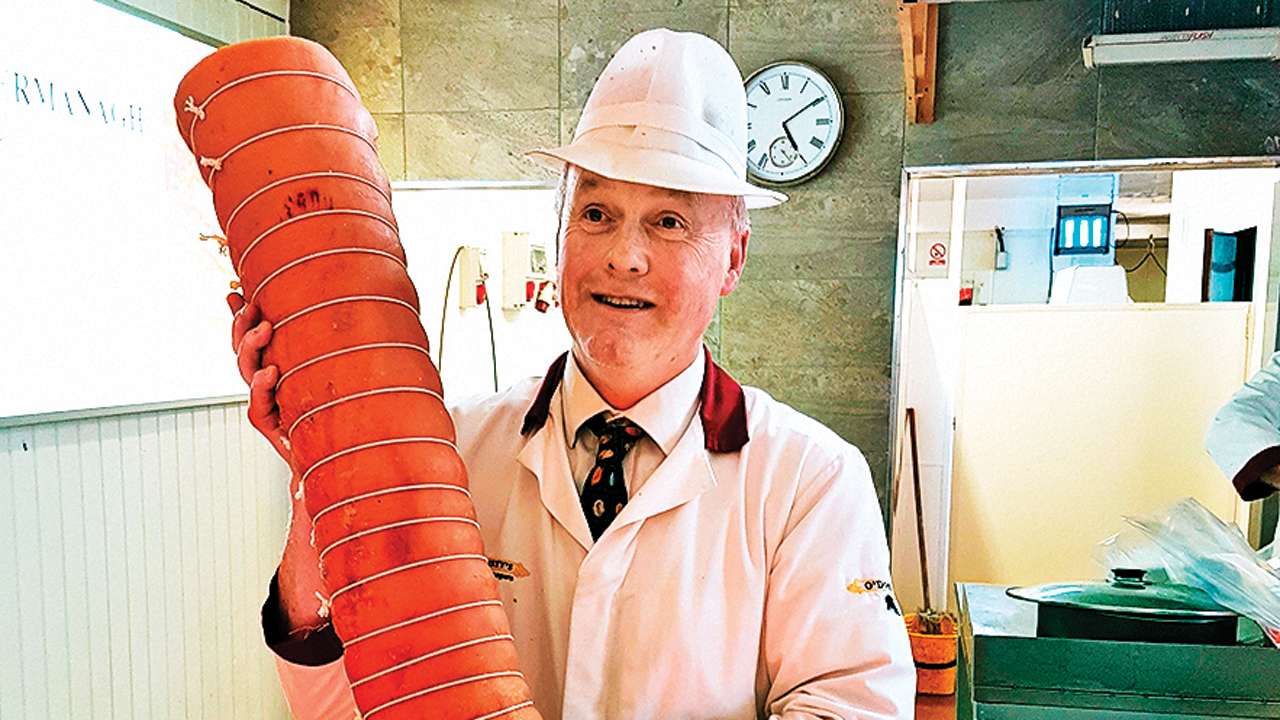
In the cacophony that exists on organic food and the slow food movement, Ireland’s is a voice apart. Antoine Lewis reports
Pat O'Doherty is something of a celebrity in Enniskillen. Almost everyone we meet around the small lake town – the lord in whose castle we are staying, the fisherman who takes us fishing in the Upper Lough (lake) Erne, our boat-taxi tour guide, the chef-instructor who taught us to make Irish stew and apple crumble – asks us the same question: will you be meeting Pat O'Doherty?
It's a surprising question because O'Doherty is not a chef, nor does he run a fancy Michelin-starred restaurant. Pat O'Doherty is a butcher, whose award-winning Fermanagh Black Bacon is famous, not just in Enniskillen and Fermanagh county, but across Ireland.
O'Doherty cheerfully greets us with a big smile, when we meet him at his family-run store, which is something of a tourist spot. A graduate in Environmental Science, O'Doherty speaks with passion about environmental issues and ecosystems and how he found the food industry to be lacking in both. So he decided he was not going to follow industry, but take a holistic approach to food production. All his meat comes from free-range animals, raised on organic, natural feed. And what makes his bacon so unique is that, unlike the commercially produced ones cheaply available in supermarkets, his bacon is organic, and phosphate and nitrite-free. It's freshly sliced, to order, wrapped in paper and packed in a paper bag. No plastic comes in touch with the bacon at any point of the process.
The turning point came in 2000 when he realised that, unable to compete with cheaper mass produced bacon, traditional Irish bacon and curing techniques were dying out. "So I went around Fermanagh, interviewing all the old Irish farmers on how they made bacon on their farms. Remember in the 1940s no one had fridges.
In order to survive, people cured the bacon on their farm with normal curing salts," he says. O'Doherty spent five years researching nitrite-free bacon and in 2006 launched it at the Salone del Gusto, Slow Food's prestigious international food exhibition in Turin. "We use only natural salts, herbs and sugar to cure our bacon, so when you fry it, you won't see any scum water, or phosphates leaching out," he says.
But it's not just his customers that he cares about.
While most of us fantasise about owning our own island, O'Doherty actually owns one. But he doesn't live on it. Enniskillen sits on one of the channels connecting the Upper and Lower Lough Ernes, which are riddled with tiny, uninhabited islands accessible only by boat. Some are used for grazing cattle, but most have only wildlife. The mile-and-half long island of Innish Corkish, owned by O'Doherty, has a slightly different set of residents.
This is where O'Doherty raises 50 pigs – all native breeds like the Fermanagh Black. The piglets are left free to roam the island and forage for their food along with the badgers, deer and other wildlife. Every night, he pops in to check on them and give them some treats. With a tinge of sadness in his voice, he tells us that when they're about a year old, they're taken from the island to their final resting place – the glass-lined display of the butcher shop. "I try to give them the best and most natural life I can while they're alive," he explains.
O'Doherty is not a fringe extremist in the Irish food space; he's emblematic of a larger organic, local produce-focussed movement across Ireland.
At the Lough Erne Resort, Executive Chef Noel McMeel joins us for lunch and gleefully recounts how he almost created a diplomatic incident. In 2013, the resort was the venue for the G8 conference. The kitchen team's state government officials sent in their menus for their respective heads of state, which required food to be imported from the native countries. McMeel would have none of it; he rejected the menus of all eight countries, refused to succumb to diplomatic pressure and ensured that all the meals were based only on local Irish produce. He's also part of an initiative that connects Irish chefs with local producers, particularly those working with
traditional, or forgotten, products and techniques.
The success of this approach is apparent in the plates served to me at Hadskis in the Cathedral Quarter of Belfast. As chef-owner Niall Mckenna explains to us, everything from the seafood, to the vegetables, fruits and meats come from local farms and fishermen. Some, like the Portavogie prawns and the Strangford scallops, even point to their source of origin on Ireland's east coast.
With its vast and bright rolling green fields, Ireland is deservedly the Emerald Isle and, this time around, Irish chefs and producers are making sure they make the best of their natural treasures.